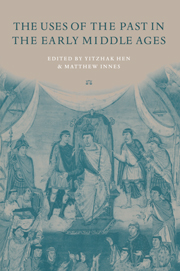Book contents
- Frontmatter
- Contents
- List of contributors
- Acknowledgements
- List of abbreviations
- Introduction: using the past, interpreting the present, influencing the future
- 1 Memory, identity and power in Lombard Italy
- 2 Memory and narrative in the cult of early Anglo-Saxon saints
- 3 The uses of the Old Testament in early medieval canon law: the Collectio Vetus Gallica and the Collectio Hibernensis
- 4 The transmission of tradition: Gregorian influence and innovation in eighth-century Italian monasticism
- 5 The world and its past as Christian allegory in the early Middle Ages
- 6 The Franks as the New Israel? Education for an identity from Pippin to Charlemagne
- 7 Political ideology in Carolingian historiography
- 8 The Annals of Metz and the Merovingian past
- 9 The empire as ecclesia: Hrabanus Maurus and biblical historia for rulers
- 10 Teutons or Trojans? The Carolingians and the Germanic Past
- 11 A man for all seasons: Pacificus of Verona and the creation of a local Carolingian past
- APPENDIX: The Memorial to Pacificus of Verona
- Index
6 - The Franks as the New Israel? Education for an identity from Pippin to Charlemagne
Published online by Cambridge University Press: 14 August 2009
- Frontmatter
- Contents
- List of contributors
- Acknowledgements
- List of abbreviations
- Introduction: using the past, interpreting the present, influencing the future
- 1 Memory, identity and power in Lombard Italy
- 2 Memory and narrative in the cult of early Anglo-Saxon saints
- 3 The uses of the Old Testament in early medieval canon law: the Collectio Vetus Gallica and the Collectio Hibernensis
- 4 The transmission of tradition: Gregorian influence and innovation in eighth-century Italian monasticism
- 5 The world and its past as Christian allegory in the early Middle Ages
- 6 The Franks as the New Israel? Education for an identity from Pippin to Charlemagne
- 7 Political ideology in Carolingian historiography
- 8 The Annals of Metz and the Merovingian past
- 9 The empire as ecclesia: Hrabanus Maurus and biblical historia for rulers
- 10 Teutons or Trojans? The Carolingians and the Germanic Past
- 11 A man for all seasons: Pacificus of Verona and the creation of a local Carolingian past
- APPENDIX: The Memorial to Pacificus of Verona
- Index
Summary
‘The Franks endeavoured, as it were, to wheel into Church history as the continuators of Israel's exploits rather than into Roman history as heirs of pagan Rome’ wrote Kantorowicz in Laudes Regiae. Even before Kantorowicz's epigrammatic formulation however, the Franks' self-representation as the Elect or the New Israel had attracted the notice of historians and it has gradually become part of the historiographical mainstream. Yet the evidence adduced to support this notion of Frankish identity is sometimes equivocal. It may therefore be useful to take a critical look at this aspect of Frankish identity in the second half of the eighth century, to reassess some of the relevant texts and to set this development in Frankish self-definition in a comparative context in order to highlight what is most distinctive about the Frankish response to the history of Israel in the Bible. Before reviewing the Frankish evidence however, it will be necessary to consider briefly the idea of election itself, the problems it poses for historians and its assimilation into modern historiography.
The concept of election by God is one of the most enduring and influential legacies of the history of the Israelites as recounted in the Bible. It has been, and continues to be, widely used by different Christian groups. In recent years the Michigan Militia and some extremist Afrikaner groups have brought it into the headlines and into disrepute.
- Type
- Chapter
- Information
- The Uses of the Past in the Early Middle Ages , pp. 114 - 161Publisher: Cambridge University PressPrint publication year: 2000
- 24
- Cited by



